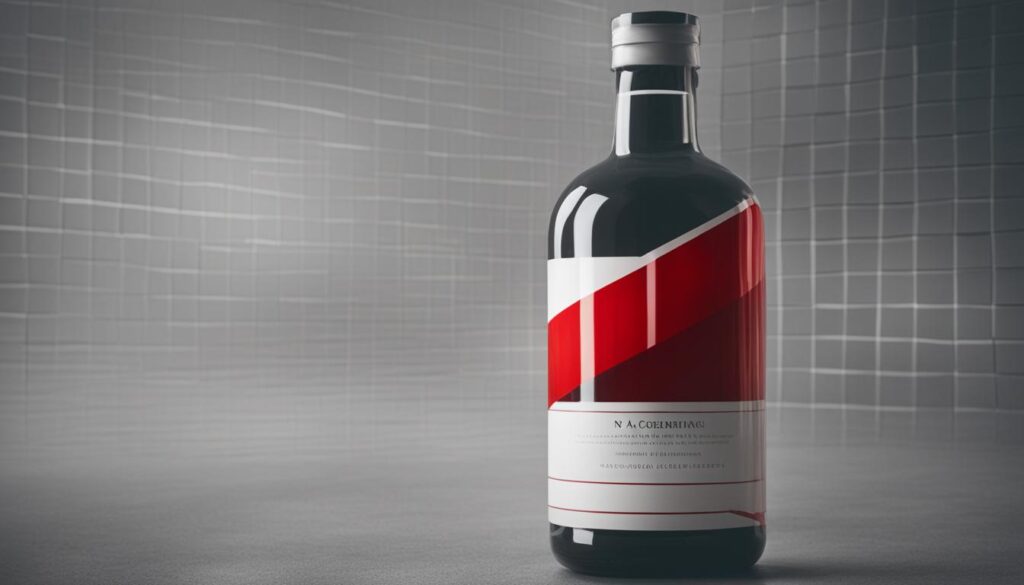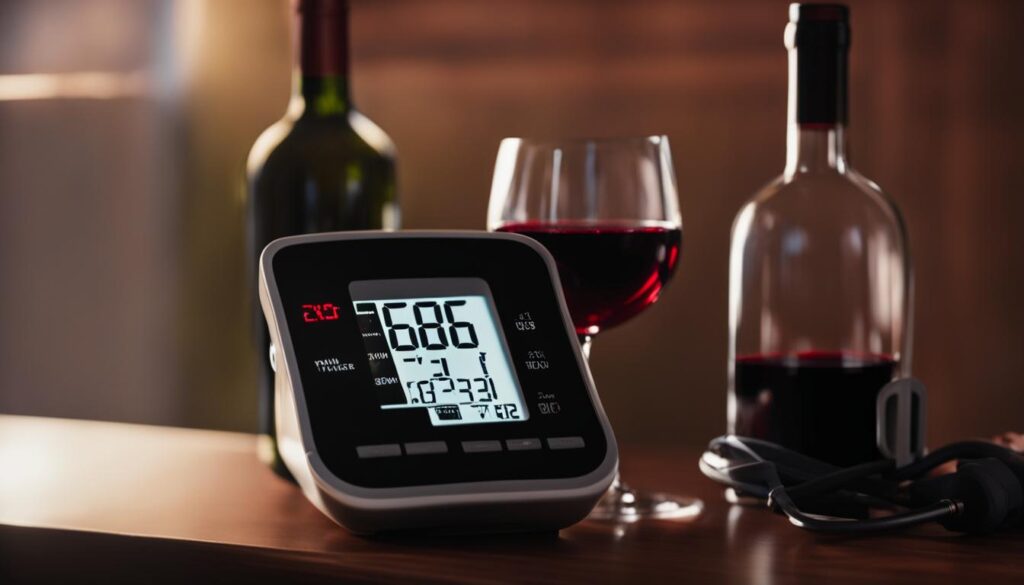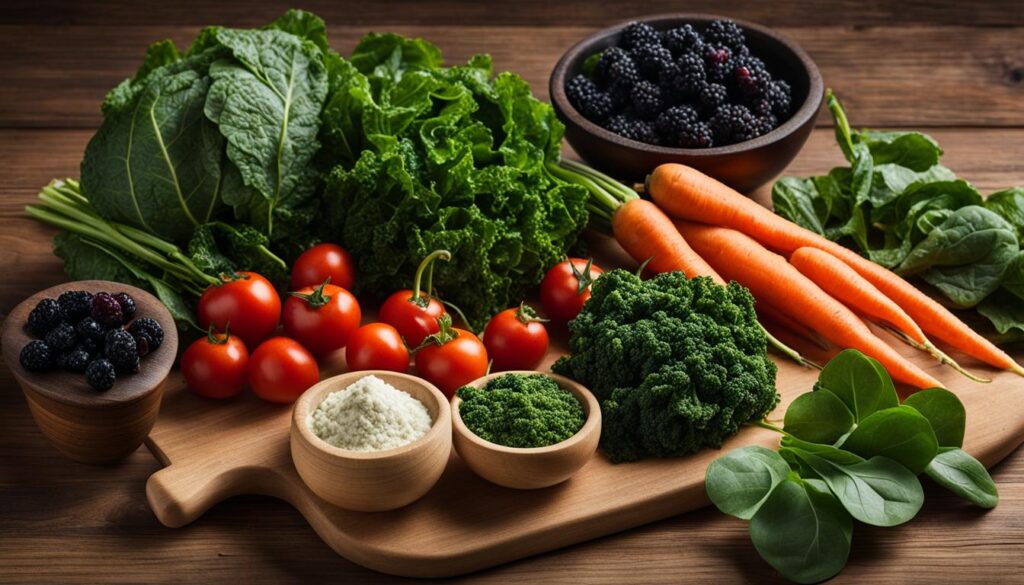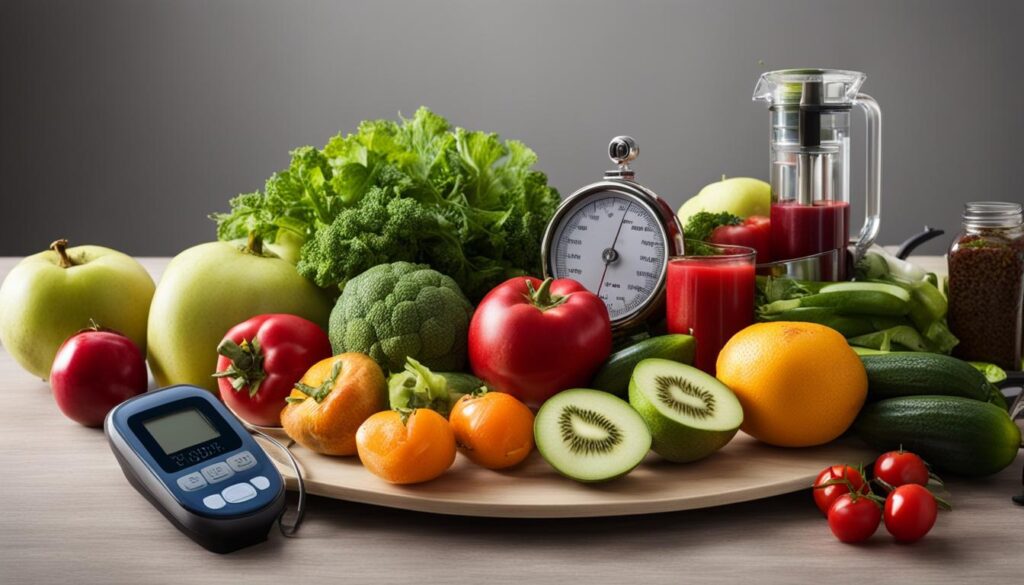High blood pressure, also known as hypertension, affects millions of people worldwide and can increase your risk of heart disease, stroke, and other serious health conditions. If you have been diagnosed with high blood pressure or want to prevent it from developing, there are several natural ways to lower your blood pressure without medication.
In this section, we will explore five proven strategies to naturally lower your blood pressure. These strategies involve making lifestyle changes, incorporating specific foods into your diet, engaging in regular exercise, and considering natural remedies for hypertension.
Key Takeaways
- Making lifestyle changes can help lower blood pressure naturally
- Incorporating specific foods into your diet can help reduce hypertension
- Regular exercise is highly beneficial for managing blood pressure
- Certain herbal and natural remedies have shown potential in lowering blood pressure
- A combination of strategies often necessary for optimal blood pressure control
Understanding Blood Pressure and Its Impact on Your Health
Before we delve into the strategies to lower blood pressure, it is important to understand what blood pressure is and how it can affect your overall health.
Blood pressure is the force of blood pushing against the walls of your arteries as your heart pumps blood throughout your body. It is measured in millimeters of mercury (mmHg) and is recorded as two numbers: systolic pressure (the top number) and diastolic pressure (the bottom number).
Normal blood pressure is typically defined as having a systolic pressure of less than 120 mmHg and a diastolic pressure of less than 80 mmHg. High blood pressure, also known as hypertension, is diagnosed when your blood pressure consistently measures 130/80 mmHg or higher.
High blood pressure can have a significant impact on your health. It increases your risk of heart disease, stroke, and kidney failure. It can also cause damage to your blood vessels, heart, and other organs over time.

Adopting a Balanced Diet to Lower Blood Pressure
One of the most effective ways to lower your blood pressure naturally is by adopting a balanced diet. Research has shown that specific foods and nutrients can help reduce blood pressure levels, making dietary changes a crucial component of hypertension management.
| Food Group | Examples |
|---|---|
| Fruits and Vegetables | Leafy greens, berries, citrus fruits, carrots, peppers |
| Whole Grains | Brown rice, quinoa, whole wheat bread, oatmeal |
| Lean Proteins | Chicken, fish, beans, tofu, nuts |
| Low-fat Dairy | Milk, yogurt, cheese |
| Healthy Fats | Avocado, olive oil, nuts, seeds |
The DASH (Dietary Approaches to Stop Hypertension) diet is one of the most well-known dietary plans for managing hypertension. The DASH diet emphasizes fruits, vegetables, whole grains, lean proteins, and low-fat dairy while limiting sodium, saturated fats, and added sugars.
In addition to emphasizing specific food groups, it is important to pay attention to serving sizes. A balanced diet should also include adequate hydration through water intake.
It is important to note that dietary changes may not always be sufficient for managing hypertension. However, incorporating specific foods into your diet can certainly have a positive impact on blood pressure levels. Consult your healthcare provider for personalized dietary recommendations.
Incorporating Exercise into Your Routine
Engaging in regular physical activity is an effective strategy for managing high blood pressure. By exercising, you can strengthen your heart and improve blood flow, which can help lower your blood pressure naturally.
There are several types of exercises that can be beneficial for hypertension management, including aerobic exercise, resistance training, and flexibility exercises.
Some examples of aerobic exercises that can help lower blood pressure include:
- Brisk walking
- Running
- Cycling
- Swimming
- Dancing
Resistance training, such as lifting weights, can also be helpful in reducing blood pressure.
Additionally, incorporating flexibility exercises, such as yoga or stretching, can contribute to better blood pressure control by improving circulation and reducing stress.
To reap the benefits of exercise for hypertension management, it is recommended to engage in at least 150 minutes of moderate-intensity aerobic activity or 75 minutes of vigorous-intensity aerobic activity per week.
Remember to start slowly and gradually increase the intensity and duration of your exercise routine. You should also consult with your healthcare provider before starting any new exercise program.

Reducing Sodium Intake for Better Blood Pressure Control
Sodium is an essential mineral in our bodies, but overconsumption of salt can have a significant impact on blood pressure. A high-sodium diet can cause the body to retain water, increasing blood volume and putting additional strain on the heart and blood vessels. Therefore, reducing sodium intake is a crucial step in managing hypertension.
The American Heart Association recommends consuming no more than 2,300 milligrams of sodium per day, with an ideal limit of no more than 1,500 milligrams per day for most adults. However, the average American consumes about 3,400 milligrams of sodium per day.
Low-Sodium Diet
One effective way to reduce sodium intake is to adopt a low-sodium diet. This type of diet involves minimizing or eliminating high-sodium foods, such as processed and packaged foods, fast food, and snacks like chips and pretzels.
Instead, focus on consuming fresh, whole foods that are naturally low in sodium, such as fruits, vegetables, whole grains, and lean proteins. When cooking, use herbs and spices to flavor your food instead of salt.
Salt and Blood Pressure
Salt is not only found in the salt shaker but is also present in many common foods. Reading food labels and choosing low-sodium alternatives can help reduce sodium intake. Pay attention to the sodium content per serving size, as some foods may appear low in sodium but actually contain high quantities in a single serving.

| Food Item | Sodium Content (mg) |
|---|---|
| Canned Chicken Noodle Soup (1 cup) | 875 |
| 1 Slice of Pizza | 640 |
| 1 Hot Dog | 560 |
| 1 Cup of Cottage Cheese | 459 |
| 1 Slice of Bread | 150 |
Table: Examples of Sodium Content in Common Foods
Keep in mind that reducing sodium intake doesn’t mean sacrificing flavor. Experimenting with herbs, spices, and citrus can add a burst of flavor to your meals without the added sodium.
By reducing your sodium intake and adopting a low-sodium diet, you can help manage your blood pressure and improve your overall health.
Managing Stress and Its Impact on Blood Pressure
Stress can have a direct impact on your blood pressure. When you experience stress, your body releases hormones that can cause your blood pressure to rise. This is a normal bodily response, but prolonged stress can lead to consistently high blood pressure levels, which can increase your risk of heart disease and other health issues.
To manage your stress and lower your blood pressure, it is essential to develop effective stress management techniques. Here are some relaxation techniques that have been shown to help lower blood pressure:
- Deep breathing: Taking deep, slow breaths can help reduce tension and promote relaxation.
- Meditation: Regular meditation practice can help reduce stress and lower blood pressure.
- Yoga: Practicing yoga can help reduce stress and lower blood pressure.
- Progressive muscle relaxation: This technique involves tensing and then relaxing different muscle groups to reduce tension and promote relaxation.
It’s important to prioritize self-care and relaxation in your daily routine to manage stress and lower your blood pressure. Make time for activities you enjoy, such as reading, listening to music, or spending time in nature. It’s also essential to get enough sleep and eat a healthy diet to support stress management.
If you find that stress is significantly impacting your daily life and blood pressure levels, consider speaking with a mental health professional. They can provide additional support and resources to help you manage your stress effectively.

Limiting Alcohol Consumption for Better Blood Pressure Management
Excessive alcohol consumption can have a negative impact on blood pressure and overall heart health. If you have hypertension, it is important to limit your alcohol intake or avoid alcohol altogether.
According to the American Heart Association, moderate alcohol consumption is defined as one drink per day for women and two drinks per day for men. However, if you have high blood pressure, it is recommended that you limit your alcohol intake to no more than one drink per day.
Additionally, certain types of alcoholic beverages may be better for blood pressure management than others. For example, red wine in moderation may have some heart-healthy benefits due to its antioxidant content. However, it is important to note that excessive alcohol consumption can negate any potential benefits and increase your blood pressure.
Overall, limiting your alcohol intake can be an effective strategy for better blood pressure management. It is important to consult with your healthcare provider to determine the appropriate level of alcohol consumption for your individual needs.

Weight Management for Blood Pressure Control
Carrying excess weight, especially around the abdominal area, can significantly increase your risk for hypertension. In fact, every 2.2 pounds of weight loss can result in a 1 mmHg reduction in systolic blood pressure.
To achieve and maintain a healthy weight, it is important to focus on a balanced diet and regular physical activity. Incorporating more whole foods, such as fruits, vegetables, whole grains, and lean proteins, can help you feel full and satisfied while providing essential nutrients for overall health. Additionally, engaging in regular physical activity can help boost your metabolism, reduce stress, and improve heart health.
If you are struggling with weight management, it may be helpful to consult with a registered dietitian or healthcare provider for personalized guidance and support.
Limiting Alcohol Consumption for Better Blood Pressure Management
Excessive alcohol consumption can have a significant impact on your blood pressure. Studies have shown that high levels of alcohol intake can lead to hypertension and other cardiovascular diseases.
So, what is considered excessive alcohol consumption? It varies based on gender and age. For men under the age of 65, no more than two drinks per day is considered moderate alcohol consumption. For women and men over 65, one drink per day is considered moderate intake. However, even moderate alcohol consumption can raise your blood pressure, so it’s best to limit your alcohol intake as much as possible.
Drinking guidelines for hypertension management include:
- Avoid binge drinking
- Space out your drinks and have non-alcoholic beverages in between
- Avoid drinking alcohol before bedtime
It’s important to note that some alcoholic beverages may be worse for blood pressure than others. For example, beer and sweet or mixed drinks can be high in calories and sugar, which can contribute to weight gain and high blood pressure. On the other hand, red wine has been shown to have heart-healthy benefits when consumed in moderation.
Overall, if you choose to drink alcohol, it’s important to do so in moderation and to be mindful of your intake. By limiting alcohol consumption, you can better manage your blood pressure and reduce your risk of heart disease.

Herbal and Natural Remedies for Lowering Blood Pressure
While lifestyle changes are often the first line of defense against high blood pressure, certain herbal and natural remedies may also have potential in lowering blood pressure. Here are some of the most promising remedies:
Garlic
Garlic has been used for centuries for its medicinal properties, including its ability to lower blood pressure. According to some studies, garlic supplements can significantly reduce both systolic and diastolic blood pressure. While the exact mechanism behind garlic’s blood pressure-lowering effects is not yet clear, it may have to do with its ability to improve blood flow and reduce inflammation in the body.
Hibiscus Tea
Hibiscus tea is a popular herbal remedy for high blood pressure, with several studies demonstrating its effectiveness. According to the American Heart Association, drinking hibiscus tea daily may help lower both systolic and diastolic blood pressure. Hibiscus tea is rich in antioxidants and compounds that have been shown to improve blood vessel function and reduce inflammation in the body.
Fish Oil
Fish oil supplements are a rich source of omega-3 fatty acids, which have been shown to have numerous health benefits, including the ability to reduce blood pressure. According to some studies, omega-3 supplements can significantly lower both systolic and diastolic blood pressure in people with hypertension. While the exact mechanism behind these effects is not yet clear, it may have to do with omega-3’s ability to reduce inflammation and improve blood vessel function.
It is important to note that while certain herbal and natural remedies may have potential in lowering blood pressure, they should not be used as a substitute for medical treatment. Always consult with your healthcare provider before taking any supplements or making significant changes to your diet or lifestyle.

Monitoring and Regular Check-ups for Hypertension
To effectively manage hypertension, it is crucial to monitor your blood pressure regularly and visit your healthcare provider for regular check-ups. By doing so, you can ensure that your blood pressure is within a healthy range and identify any potential complications early on.
When monitoring your blood pressure at home, it is important to use a reliable blood pressure monitor and follow the instructions carefully. Take multiple readings at different times of the day and keep a record of your readings to share with your healthcare provider.
During your regular check-ups, your healthcare provider will measure your blood pressure and assess your overall health. They may also recommend additional tests or refer you to a specialist if necessary.
Don’t underestimate the importance of monitoring and check-ups when it comes to hypertension management. Make it a priority to keep track of your blood pressure and seek medical attention when needed.

Combining Strategies for Optimal Blood Pressure Control
Lowering your blood pressure requires a comprehensive approach that involves making lifestyle changes and considering natural remedies. Combining multiple strategies can often be more effective than relying on a single approach. By adopting a holistic approach to blood pressure control, you can achieve the best results possible.
Implementing a Combination Approach
A combination approach involves incorporating different strategies that work together to lower blood pressure. For example, you can begin by adopting a balanced diet that includes foods known to reduce blood pressure, such as leafy greens, berries, and fish. You can then incorporate regular physical activity, such as brisk walking or swimming, to further reduce your blood pressure levels.
Managing stress through relaxation techniques like deep breathing or yoga can also play a crucial role in controlling blood pressure. Additionally, maintaining a healthy weight through a combination of diet and exercise can help reduce blood pressure levels.
Herbal and Natural Remedies
Along with lifestyle changes, some herbal and natural remedies have shown potential in reducing blood pressure levels. For instance, garlic has been shown to lower blood pressure in some individuals, and hibiscus tea has been found to have a mild blood pressure-lowering effect. Fish oil supplements may also be helpful for some people with hypertension. However, it’s important to note that natural remedies should be used in conjunction with lifestyle changes and under the guidance of a healthcare professional.
Regular Monitoring and Check-Ups
Monitoring your blood pressure regularly is another vital part of a combination approach. This allows you to keep track of your progress and make any necessary adjustments to your treatment plan. In addition to monitoring your blood pressure at home, it’s also essential to visit your healthcare provider for regular check-ups. They can help you manage your hypertension and ensure that any medication you’re taking is effective.
Final Thoughts
By combining different strategies, you can achieve optimal blood pressure control and improve your overall health. Remember to adopt a balanced diet, incorporate regular physical activity, manage stress, maintain a healthy weight, consider herbal remedies, monitor your blood pressure regularly, and visit your healthcare provider for check-ups. With a holistic approach to blood pressure control, you can effectively lower your blood pressure and improve your quality of life.

Conclusion
Congratulations! You have now explored five proven strategies to naturally lower your blood pressure. By adopting a balanced diet, incorporating exercise, managing stress, maintaining a healthy weight, limiting alcohol consumption, considering herbal remedies, monitoring blood pressure, and combining strategies, you can effectively lower your blood pressure naturally.
Remember to make small, consistent changes to your lifestyle and habits to achieve long-term success. It is important to work closely with your healthcare provider to develop a personalized plan for managing your blood pressure.
By implementing these proven strategies, you are taking a proactive step towards improving your heart health and enhancing your overall quality of life. Start making these changes today and enjoy the benefits of lower blood pressure!
FAQ
How can I naturally lower my blood pressure?
There are several proven strategies to naturally lower your blood pressure. These include adopting a balanced diet, incorporating regular exercise, managing stress, maintaining a healthy weight, limiting alcohol consumption, considering herbal remedies, monitoring blood pressure, and combining various strategies.
What is blood pressure and how does it impact my health?
Blood pressure refers to the force of blood against the walls of your arteries as your heart pumps it around your body. High blood pressure, also known as hypertension, can have a negative impact on your overall health and increase your risk of heart disease, stroke, and other health complications.
What foods can help lower blood pressure?
Certain foods have been shown to help lower blood pressure levels. These include fruits, vegetables, whole grains, lean proteins, and low-fat dairy products. Following a balanced diet, such as the DASH diet (Dietary Approaches to Stop Hypertension), can be beneficial for managing blood pressure.
What types of exercises can help lower blood pressure?
Engaging in regular physical activity can contribute to lowering blood pressure. Activities such as brisk walking, jogging, cycling, swimming, and strength training can be effective in managing hypertension. It is important to consult with your healthcare provider before starting any exercise program.
How does sodium intake affect blood pressure?
Consuming excessive amounts of sodium can contribute to high blood pressure. It is recommended to reduce sodium intake by limiting the consumption of processed and packaged foods, reading food labels for sodium content, and cooking meals using less salt. Opting for a low-sodium diet can help manage blood pressure.
How does stress impact blood pressure and what are some stress management techniques?
Stress can directly affect blood pressure levels. Chronic stress can contribute to hypertension. Effective stress management techniques include practicing relaxation exercises such as deep breathing, meditation, yoga, and engaging in activities that promote relaxation, such as hobbies and spending time with loved ones.
How does maintaining a healthy weight help control blood pressure?
Maintaining a healthy weight is crucial for managing blood pressure. Being overweight or obese can increase your risk of developing hypertension. Achieving a healthy weight range can be done through a combination of a balanced diet and regular physical activity.
How does alcohol consumption impact blood pressure?
Excessive alcohol consumption can contribute to high blood pressure. It is recommended to follow guidelines for moderate drinking, which include limiting alcohol intake to one drink per day for women and up to two drinks per day for men. Reducing alcohol consumption can help better manage blood pressure.
Are there any herbal or natural remedies that can help lower blood pressure?
Alongside lifestyle changes, certain herbal and natural remedies have shown potential in lowering blood pressure. Some examples include garlic, hibiscus tea, and fish oil supplements. It is important to consult with your healthcare provider before incorporating any herbal remedies into your routine.
How often should I monitor my blood pressure and visit my healthcare provider?
Regular monitoring of your blood pressure at home is important for managing hypertension. Your healthcare provider will provide guidance on how often you should check your blood pressure. It is also recommended to visit your healthcare provider for regular check-ups to assess your overall health and blood pressure levels.
Is it necessary to combine different strategies for optimal blood pressure control?
Yes, combining various strategies is often necessary to achieve optimal blood pressure control. A holistic approach that includes adopting a balanced diet, engaging in regular exercise, managing stress, maintaining a healthy weight, limiting alcohol consumption, considering herbal remedies, and monitoring blood pressure can yield the best results in managing hypertension.


